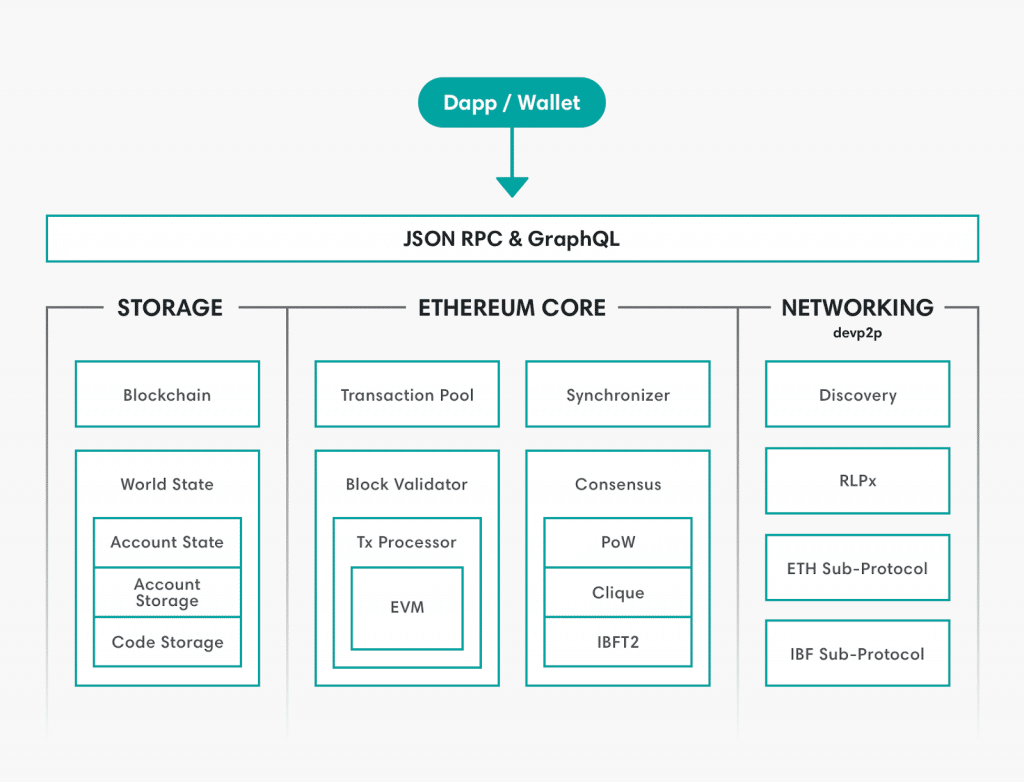
Hyperledger Besu
By:
In: Technical -
Hyperledger Besu is an Ethereum client designed to be enterprise-friendly for both public and private permissioned network use cases. It can also be ran on test networks such as Rinkeby, Ropsten, and Görli. Hyperledger Besu includes several consensus algorithms including PoW, and PoA (IBFT, IBFT 2.0, Etherhash, and Clique). Its comprehensive permissioning schemes are designed specifically for use in a consortium environment.
Hyperledger Besu’s features include:
- The Ethereum Virtual Machine (EVM): The EVM is the Turing complete virtual machine that allows the deployment and execution of smart contracts via transactions within an Ethereum blockchain.
- Consensus Algorithms: Hyperledger Besu implements various consensus algorithms which are involved in transaction validation, block validation, and block production (i.e., mining in Proof of Work). They include:
- Proof of Authority: Hyperledger Besu implements several Proof of Authority protocols. Proof of Authority consensus protocols are used when participants are known to each other and there is a level of trust between them––in a permissioned consortium network, for example.
- IBFT 2.0: In IBFT 2.0 networks, transactions and blocks are validated by approved accounts, known as validators. Validators take turns creating the next block. Existing validators propose and vote to add or remove validators. IBFT 2.0 has immediate finality. When using IBFT 2.0, there are no forks and all valid blocks are included in the main chain.
- Clique: Clique is more fault-tolerant than IBFT 2.0. Clique tolerates up to half of the validators failing. IBFT 2.0 networks require greater than or equal to ⅔ of validators to be operating to create blocks. Clique does not have immediate finality. Implementations using Clique must be aware of forks and chain reorganizations occurring.
- Proof of Work (Ethash): Proof of Work is used for mining activities on mainnet Ethereum.
- Proof of Authority: Hyperledger Besu implements several Proof of Authority protocols. Proof of Authority consensus protocols are used when participants are known to each other and there is a level of trust between them––in a permissioned consortium network, for example.
- Storage: Hyperledger Besu uses a RocksDB key-value database to persist chain data locally. This data is divided into a few sub-categories:
- Blockchain: Blockchain data is composed of block headers that form the “chain” of data that is used to cryptographically verify blockchain state; block bodies that contain the list of ordered transactions included in each block; and transaction receipts that contain metadata related to transaction execution including transaction logs.
- World State: Every block header references a world state via a stateRoot hash. The world state is a mapping from addresses to accounts. Externally owned accounts contain an ether balance, while smart contract accounts additionally contain executable code and storage.
- P2P networking: Hyperledger Besu implements Ethereum’s devp2p network protocols for inter-client communication and an additional sub-protocol for IBFT2:
- Discovery: A UDP-based protocol for finding peers on the network
- RLPx: A TCP-based protocol for communication between peers via various “sub-protocols”:
- ETH Sub-protocol (Ethereum Wire Protocol): Used to synchronize blockchain state across the network and propagate new transactions.
- IBF Sub-protocol: Used by IBFT2 consensus protocol to facilitate consensus decisions.
- User-facing APIs: Hyperledger Besu provides mainnet Ethereum and EEA JSON-RPC APIs over HTTP and WebSocket protocols as well as a GraphQL API.
- JSON-RPC
- HTTP JSON-RPC Service
- WebSocket JSON-RPC Service
- GraphQL
- JSON-RPC
- Monitoring: Hyperledger Besu allows you to monitor node and network performance.
- Node performance is monitored using Prometheus or the debug_metrics JSON-RPC API method.
- Network Performance is monitored with Epirus tools such as Block Explorer and EthStats Network Monitor.
- Privacy: Privacy in Hyperledger Besu refers to the ability to keep transactions private between the involved parties. Other parties cannot access the transaction content, sending party, or list of participating parties. Besu uses a Private Transaction Manager to implement privacy.
- Permissioning: A permissioned network allows only specified nodes and accounts to participate by enabling node permissioning and/or account permissioning on the network.
